Recommended Books
Grades 6-8 – Japan
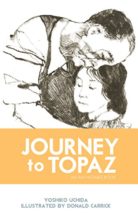
Journey To Topaz: A Story Of The Japanese-American Evacuation
Based on Yoshiko Uchida’s personal experiences, this is the moving story of one girl’s struggle to remain brave during the Japanese internment of World War II. In a bleak and dusty prison camp, eleven-year-old Yuki and her family experience both true friendship and heart-wrenching tragedy. Journey to Topaz explores the consequences of prejudice and the capacities of the human spirit. First published in 1971, this book is now a much loved and widely read classic.
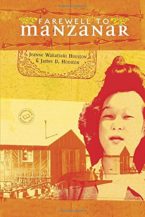
Farewell to Manzanar
Jeanne Wakatsuki was seven years old in 1942 when her family was uprooted from their home and sent to live at Manzanar internment camp–with 10,000 other Japanese Americans. Along with searchlight towers and armed guards, Manzanar ludicrously featured cheerleaders, Boy Scouts, sock hops, baton twirling lessons and a dance band called the Jive Bombers who would play any popular song except the nation’s #1 hit: “Don’t Fence Me In.”
Farewell to Manzanar is the true story of one spirited Japanese-American family’s attempt to survive the indignities of forced detention . . . and of a native-born American child who discovered what it was like to grow up behind barbed wire in the United States.
From the Paperback edition.
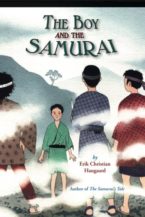
The Boy and the Samurai
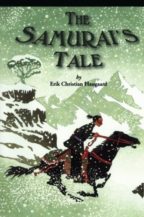
The Samurai's Tale
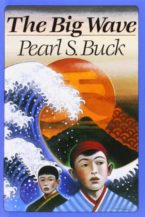
The Big Wave
The powerful novel by Nobel Prize-winning author Pearl S. Buck, about two friends who must face the pain of losing everything—and how to face their grief with courage.
Kino lives on a farm on the side of a mountain in Japan. His friend, Jiya, lives in a fishing village below. Everyone, including Kino and Jiya, has heard of the big wave. No one suspects it will wash over them, until the rushing water sweeps away the whole village—including Jiya’s family.
As Jiya struggles to overcome his sorrow, with the help of Kino and his father, he comes to understand that it is only in the presence of danger that one learns to be brave, and that even in the face of terrible tragedy, life and love are stronger than death.
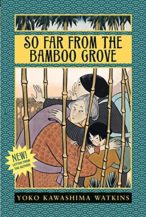
So Far from the Bamboo Grove
In the final days of World War II, Koreans were determined to take back control of their country from the Japanese and end the suffering caused by the Japanese occupation. As an eleven-year-old girl living with her Japanese family in northern Korea, Yoko is suddenly fleeing for her life with her mother and older sister, Ko, trying to escape to Japan, a country Yoko hardly knows.
Their journey is terrifying—and remarkable. It’s a true story of courage and survival that highlights the plight of individual people in wartime. In the midst of suffering, acts of kindness, as exemplified by a family of Koreans who risk their own lives to help Yoko’s brother, are inspiring reminders of the strength and resilience of the human spirit.
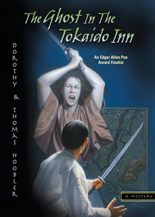
The Ghost in the Tokaido Inn (The Samurai Mysteries)
While attempting to solve the mystery of a stolen jewel, Seikei, a merchant’s son who longs to be a samurai, joins a group of kabuki actors in eighteenth-century Japan.
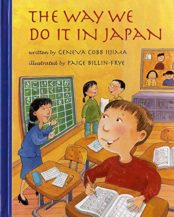
The Way We Do It in Japan
Gregory and his family are moving to Japan for his dad’s job. After the long flight, they arrive at their new apartment. Gregory is surprised to find lots of things that are different: but that’s the way they do it in Japan.
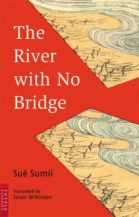
The River with No Bridge
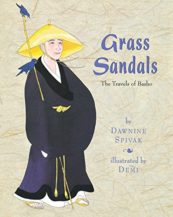
Grass Sandals: The Travels of Basho
An evocative portrait of the great Japanese haiku poet describes Basho’s many experiences as he traveled throughout his beloved native Japan, in a volume that also includes haiku written by Basho and Japanese characters that represent words from the verses.
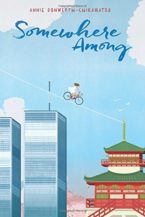
Somewhere Among
In this beautiful and haunting debut novel in verse, called “a tender piece on connectedness” in a starred review from Kirkus Reviews, an American-Japanese girl struggles with the loneliness of being caught between two worlds when the tragedy of 9/11 strikes an ocean away.
Eleven-year-old Ema has always been of two worlds–her father’s Japanese heritage and her mother’s life in America. She lives in Japan and has spent summers in California for as long as she can remember, but this year she and her mother are staying with her grandparents in western Tokyo as they await the arrival of Ema’s baby sibling. Her mother’s pregnancy has been tricky, putting everyone on edge, but Ema’s heart is singing–finally, there will be someone else who will understand what it’s like to belong and not belong at the same time.
But Ema’s good spirits are muffled by her grandmother who is cold, tightfisted, and quick to reprimand her for the slightest infraction. Then, when their stay is extended and Ema must go to a new school, her worries of not belonging grow. And when the tragedy of 9/11 strikes, Ema, her parents, and the world watch as the twin towers fall…
As Ema watches her mother grieve for her country across the ocean–threatening the safety of her pregnancy–and her beloved grandfather falls ill, she feels more helpless and hopeless than ever. And yet, surrounded by tragedy, Ema sees for the first time the tender side of her grandmother, and the reason for the penny-pinching and sternness make sense–her grandmother has been preparing so they could all survive the worst.
Dipping and soaring, Somewhere Among is the story of one girl’s search for identity, inner peace, and how she discovers that hope can indeed rise from the ashes of disaster.
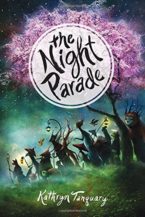
The Night Parade
“I thought you might sleep through it.” The creature smiled.
Saki’s voice was little more than a whisper. “Sleep through what?”
It leaned over. She stared into its will-o’-the-wisp eyes.
“The Night Parade, of course.”
The last thing Saki Yamamoto wants to do for her summer vacation is trade in exciting Tokyo for the antiquated rituals and bad cell reception of her grandmother’s village. Preparing for the Obon ceremony is boring. Then the local kids take interest in Saki and she sees an opportunity for some fun, even if it means disrespecting her family’s ancestral shrine on a malicious dare.
But as Saki rings the sacred bell, the darkness shifts. A death curse has been invoked…and Saki has three nights to undo it. With the help of three spirit guides and some unexpected friends, Saki must prove her worth―or say goodbye to the world of the living forever…
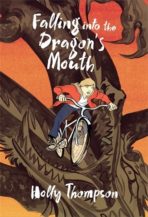
Falling into the Dragon's Mouth
In a Japanese seaside neighborhood lives Jason Parker:
a sixth grader
one year older than his classmates
a stinking foreigner to some classmates
an orange belt in aikido
a big brother
Jason Parker is just a boy trying to get through his days with calm and courage. If only everyone around him would let him.
This is a beautifully spare novel in verse about one boy’s life–a story that will resonate with anyone who has ever struggled to fit in.

Hotaka: Through My Eyes – Natural Disaster Zones
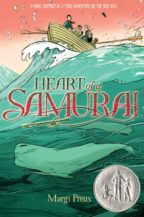
Heart of a Samurai
In 1841, a Japanese fishing vessel sinks. Its crew is forced to swim to a small, unknown island, where they are rescued by a passing American ship. Japan’s borders remain closed to all Western nations, so the crew sets off to America, learning English on the way. Manjiro, a fourteen-year-old boy, is curious and eager to learn everything he can about this new culture. Eventually the captain adopts Manjiro and takes him to his home in New England. The boy lives for some time in New England, and then heads to San Francisco to pan for gold. After many years, he makes it back to Japan, only to be imprisoned as an outsider. With his hard-won knowledge of the West, Manjiro is in a unique position to persuade the shogun to ease open the boundaries around Japan; he may even achieve his unlikely dream of becoming a samurai.

Grenade
A New York Times bestseller!
It’s 1945, and the world is in the grip of war.
Hideki lives on the island of Okinawa, near Japan. When WWII crashes onto his shores, Hideki is drafted into the Blood and Iron Student Corps to fight for the Japanese army. He is handed a grenade and a set of instructions: Don’t come back until you’ve killed an American soldier.
Ray, a young American Marine, has just landed on Okinawa. He doesn’t know what to expect — or if he’ll make it out alive. He just knows that the enemy is everywhere.
Hideki and Ray each fight their way across the island, surviving heart-pounding ambushes and dangerous traps. But when the two of them collide in the middle of the battle, the choices they make in that instant will change everything.
From the acclaimed author of Refugee comes this high-octane story of how fear can tear us apart, and how hope can tie us back together.
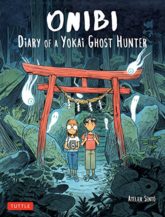
Onibi: Diary of a Yokai Ghost Hunter
*Winner Japan International Manga Award*
Part fantasy, part travelogue—this graphic novel transports readers to the intersection of the natural and supernatural worlds.
Onibi: Diary of a Yokai Ghost Hunter follows the adventures of two young foreigners as they travel to a remote and mysterious corner of Japan. Along the way, they purchase an old camera that has the unique ability to capture images of Japan’s invisible spirit world. Armed with their magical camera, they explore the countryside and meet people who tell them about the forgotten ghosts, ghouls and demons who lie in wait ready to play tricks on them. These Yokai, or supernatural beings, are sometimes kind, sometimes mischievous, and sometimes downright dangerous!
Readers young and old will enjoy following along on this journey of mystery and discovery. The comic book format will appeal to anime and manga fans, while introducing the ancient spirit world that is such an important part of Japanese culture.
With the help of Atelier Sento’s gorgeous watercolor and colored pencil artwork, you can’t help but feel immersed in this fantasy.
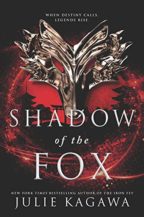
Shadow of the Fox
One thousand years ago, the great Kami Dragon was summoned to grant a single terrible wish—and the land of Iwagoto was plunged into an age of darkness and chaos.
Now, for whoever holds the Scroll of a Thousand Prayers, a new wish will be granted. A new age is about to dawn.
Raised by monks in the isolated Silent Winds temple, Yumeko has trained all her life to hide her yokai nature. Half kitsune, half human, her skill with illusion is matched only by her penchant for mischief. Until the day her home is burned to the ground, her adoptive family is brutally slain and she is forced to flee for her life with the temple’s greatest treasure—one part of the ancient scroll.
There are many who would claim the dragon’s wish for their own. Kage Tatsumi, a mysterious samurai of the Shadow Clan, is one such hunter, under orders to retrieve the scroll…at any cost. Fate brings Kage and Yumeko together. With a promise to lead him to the scroll, an uneasy alliance is formed, offering Yumeko her best hope for survival. But he seeks what she has hidden away, and her deception could ultimately tear them both apart.
With an army of demons at her heels and the unlikeliest of allies at her side, Yumeko’s secrets are more than a matter of life or death. They are the key to the fate of the world itself.
New from the New York Times bestselling author of The Talon Saga and The Iron Fey. Fans of Sarah J. Maas, Julie C. Dao, Marie Lu, Cassandra Clare and more bestselling YA fantasy will be captivated by book one of this enchanting new series.
“One of my all-time favorite fantasy novels! I’m in love with this book, its characters, its worldbuilding!”
—Ellen Oh, author of the Prophecy and Spirit Hunters series
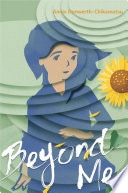
Beyond Me
In the spirit of A Place to Belong, this remarkable novel-in-verse examines the aftershocks of the earthquake and tsunami that devastated Japan in 2011 through the eyes of a young girl who learns that even the smallest kindness can make a difference. March 11, 2011 An earthquake shakes Japan to its core. A tsunami crashes into Japan’s coast. Everything changes. In the aftermath of the natural disasters that have struck her country, eleven-year-old Maya is luckier than many. Her family didn’t lose their home, their lives, or each other. But Maya still can’t help feeling paralyzed with terror, and each aftershock that ripples out in the days that follow makes her fear all over again that her luck could change in an instant. As word of the devastation elsewhere grows increasingly grim—tens of thousands have perished—it all seems so huge, so irreparable. Already flinching at every rumble from the earth, Maya’s overcome with a sense of helplessness and hopelessness. How can her country ever recover, and how could anything she does possibly make a difference? Before Maya can extend a hand to others, she must dig deep to find the hidden well of strength in herself in this sweeping, searing novel that shows even small acts can add something greater and help people and communities heal.
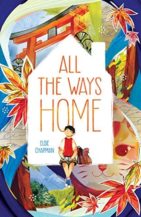
All the Ways Home
Sometimes, home isn’t where you expect to find it.
After losing his mom in a fatal car crash, Kaede Hirano–now living with a grandfather who is more stranger than family–developed anger issues and spent his last year of middle school acting out.
Best-friendless and critically in danger repeating the seventh grade, Kaede is given a summer assignment: write an essay about what home means to him, which will be even tougher now that he’s on his way to Japan to reconnect with his estranged father and older half-brother. Still, if there’s a chance Kaede can finally build a new family from an old one, he’s willing to try. But building new relationships isn’t as easy as destroying his old ones, and one last desperate act will change the way Kaede sees everyone–including himself.
This is a book about what home means to us—and that there are many different correct answers.
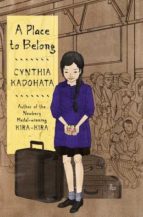
A Place to Belong
A Japanese-American family, reeling from their ill treatment in the Japanese internment camps, gives up their American citizenship to move back to Hiroshima, unaware of the devastation wreaked by the atomic bomb in this piercing look at the aftermath of World War II by Newbery Medalist Cynthia Kadohata.
World War II has ended, but while America has won the war, twelve-year-old Hanako feels lost. To her, the world, and her world, seems irrevocably broken.
America, the only home she’s ever known, imprisoned then rejected her and her family—and thousands of other innocent Americans—because of their Japanese heritage, because Japan had bombed Pearl Harbor, Hawaii.
Japan, the country they’ve been forced to move to, the country they hope will be the family’s saving grace, where they were supposed to start new and better lives, is in shambles because America dropped bombs of their own—one on Hiroshima unlike any other in history. And Hanako’s grandparents live in a small village just outside the ravaged city.
The country is starving, the black markets run rampant, and countless orphans beg for food on the streets, but how can Hanako help them when there is not even enough food for her own brother?
Hanako feels she could crack under the pressure, but just because something is broken doesn’t mean it can’t be fixed. Cracks can make room for gold, her grandfather explains when he tells her about the tradition of kintsukuroi—fixing broken objects with gold lacquer, making them stronger and more beautiful than ever. As she struggles to adjust to find her place in a new world, Hanako will find that the gold can come in many forms, and family may be hers.
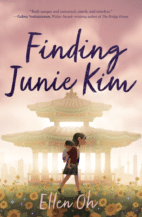
Finding Junie Kim
Junie Kim just wants to fit in. So she keeps her head down and tries not to draw attention to herself. But when racist graffiti appears at her middle school, Junie must decide between staying silent or speaking out.
Then Junie’s history teacher assigns a project and Junie decides to interview her grandparents, learning about their unbelievable experiences as kids during the Korean War. Junie comes to admire her grandma’s fierce determination to overcome impossible odds, and her grandpa’s unwavering compassion during wartime. And as racism becomes more pervasive at school, Junie taps into the strength of her ancestors and finds the courage to do what is right.
Finding Junie Kim is a reminder that within all of us lies the power to overcome hardship and emerge triumphant.
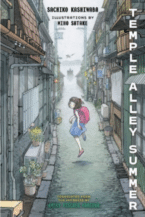
Temple Alley Summer
Kazu knows something odd is going on when he sees a girl in a white kimono sneak out of his house in the middle of the night—was he dreaming? Did he see a ghost? Things get even stranger when he shows up to school the next day to see the very same figure sitting in his classroom. No one else thinks it’s weird, and, even though Kazu doesn’t remember ever seeing her before, they all seem convinced that the ghost-girl Akari has been their friend for years!
When Kazu’s summer project to learn about Kimyo Temple draws the meddling attention of his mysterious neighbor Ms. Minakami and his secretive new classmate Akari, Kazu soon learns that not everything is as it seems in his hometown. Kazu discovers that Kimyo Temple is linked to a long forgotten legend about bringing the dead to life, which could explain Akari’s sudden appearance—is she a zombie or a ghost? Kazu and Akari join forces to find and protect the source of the temple’s power. An unfinished story in a magazine from Akari’s youth might just hold the key to keeping Akari in the world of the living, and it’s up to them to find the story’s ending and solve the mystery as the adults around them conspire to stop them from finding the truth.
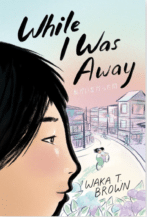
While I was Away
When twelve-year-old Waka’s parents suspect she can’t understand the basic Japanese they speak to her, they make a drastic decision to send her to Tokyo to live for several months with her strict grandmother. Forced to say goodbye to her friends and what would have been her summer vacation, Waka is plucked from her straight-A-student life in rural Kansas and flown across the globe, where she faces the culture shock of a lifetime.
In Japan, Waka struggles with reading and writing in kanji, doesn’t quite mesh with her complicated and distant Obaasama, and gets made fun of by the students in her Japanese public-school classes. Even though this is the country her parents came from, Waka has never felt more like an outsider.
If she’s always been the “smart Japanese girl” in America but is now the “dumb foreigner” in Japan, where is home…and who will Waka be when she finds it?
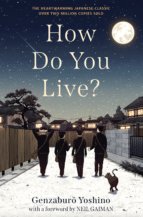
How Do You Live?
First published in 1937, Genzaburō Yoshino’s How Do You Live? has long been acknowledged in Japan as a crossover classic for young readers. Academy Award–winning animator Hayao Miyazaki has called it his favorite childhood book and announced plans to emerge from retirement to make it the basis of his final film.
How Do You Live? is narrated in two voices. The first belongs to Copper, fifteen, who after the death of his father must confront inevitable and enormous change, including his own betrayal of his best friend. In between episodes of Copper’s emerging story, his uncle writes to him in a journal, sharing knowledge and offering advice on life’s big questions as Copper begins to encounter them. Over the course of the story, Copper, like his namesake Copernicus, looks to the stars, and uses his discoveries about the heavens, earth, and human nature to answer the question of how he will live.
This first-ever English-language translation of a Japanese classic about finding one’s place in a world both infinitely large and unimaginably small is perfect for readers of philosophical fiction like The Alchemist and The Little Prince, as well as Miyazaki fans eager to understand one of his most important influences.
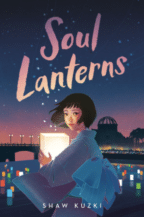
Soul Lanterns
Twelve-year-old Nozomi lives in the Japanese city of Hiroshima. She wasn’t even born when the bombing of Hiroshima took place. Every year Nozomi joins her family at the lantern-floating ceremony to honor those lost in the bombing. People write the names of their deceased loved ones along with messages of peace, on paper lanterns and set them afloat on the river. This year Nozomi realizes that her mother always releases one lantern with no name. She begins to ask questions, and when complicated stories of loss and loneliness unfold, Nozomi and her friends come up with a creative way to share their loved ones’ experiences. By opening people’s eyes to the struggles they all keep hidden, the project teaches the entire community new ways to show compassion.
Soul Lanterns is an honest exploration of what happened on August 6, 1945, and offers readers a glimpse not only into the rich cultural history of Japan but also into the intimate lives of those who recognize–better than most–the urgent need for peace.
